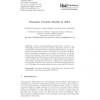Free Online Productivity Tools
i2Speak
i2Symbol
i2OCR
iTex2Img
iWeb2Print
iWeb2Shot
i2Type
iPdf2Split
iPdf2Merge
i2Bopomofo
i2Arabic
i2Style
i2Image
i2PDF
iLatex2Rtf
Sci2ools
CBRMD
2010
2010
Semantic Content Models in ARA
Abstract. Clinical research significantly contributes to the better understanding of diseases and their treatment. Physicians, however, could not take fully advantage of the resulting scientific knowledge. To improve sharing and processing of primary clinical data new generation technologies for knowledge management are needed. In this paper we discuss some of their features on the basis of a real-world system in the domain Nephropathotology. We propose several interpretations of user-aware behavior and show how they influence the understanding and assessing of the similarity in CBR theory. Moreover, we illustrate our point with several examples, inspired by the experience, gained during the development of a CBR-based search engine within the scope of the OpEN.SC project.
Related Content
| Added | 01 Feb 2011 |
| Updated | 01 Feb 2011 |
| Type | Journal |
| Year | 2010 |
| Where | CBRMD |
| Authors | Nadezhda Govedarova, Sonja Niepage, Hans-Dieter Burkhard |
Comments (0)

